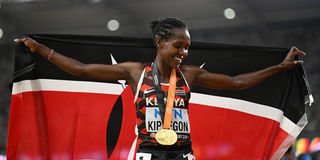Premium
Power of sports can be harnessed to advance gender equality

Kenya's gold medallist Faith Kipyegon celebrates with her national flag after the women's 5000m final during the World Athletics Championships at the National Athletics Centre in Budapest on August 26, 2023.
What you need to know:
- The Paris 2024 Olympic Games will be the first in history with full gender parity on the field of play at 50/50 per cent
- This has been through deliberate efforts to promote the participation of women at the highest level by the International Olympic Committee (IOC)
- The IOC therefore will balance the scheduling of Games time events, give equal broadcasting as well as fair and balanced portrayal of athletes at the Paris Games
As the world celebrated International Women's Day this week, the Olympic Movement, Kenya included, chose to celebrate by reflecting on the strides made in women's sports over the years.
These actions, over the years, reflect greatly on how women will participate, be represented, and be portrayed in the run up to the Paris 2024 Olympic Games in France in July.
The Paris 2024 Olympic Games will be the first in history with full gender parity on the field of play at 50/50 per cent.
This has been through deliberate efforts to promote the participation of women at the highest level by the International Olympic Committee (IOC).
Delivered together with the Olympic Movement, the Olympics offer equal quota places for both genders, 28 of 32 gender-equal sports and new mixed-gender events.
In terms of support to elite athletes, incentives are given for female teams’ support. If an Olympic Solidarity team grant application is made for a female team, it automatically qualifies for a second grant for another female team. In our case, this enabled us to grant the national women's volleyball team, Malkia Strikers and national women's basketball team grants to support their qualification and preparation for the Olympics.
Through this approach, Kenya managed an impressive 56 per cent female representation at the Tokyo 2020 Olympics.
Since Tokyo 2020, the IOC invited National Olympic Committees (NOCs) to have their flag carried jointly by one female and one male athlete during the Opening Ceremony.
Kenya took this approach in Tokyo 2020, with Mercy Moim and Andrew Amonde, the then volleyball team and rugby sevens respective skippers as joint flag bearers.
The same in the Winter Youth Olympics Gangwon 2024, with Ashley Tshanda – cross country skier and Issa Laborde - alpine skier, jointly carrying the flag at the ceremony. The same will be replicated as Kenya takes on the Seine in Paris this July.
Visibility
Out of the field of play, one of the challenges women's sports have suffered over the years is visibility. A quick look at a couple of media studies done recently shows that women’s sports receives only four per cent of sports coverage.
The IOC therefore will balance the scheduling of Games time events, give equal broadcasting as well as fair and balanced portrayal of athletes at the Paris Games.
The IOC has released a portrayal guideline that NOC-K is also using to educate local media on female sports.
NOC-K has policies around team management to promote participation at technical and leadership levels. Our capacity-building initiatives for coaches, managers, administrators, and medical personnel require at least 40-60 per cent gender representation. This is in addition to offering scholarships for women to level up their competencies to merit the positions where they are at a disadvantage.
Sports offers a powerful platform for promoting gender equality. The values espoused by the Olympic movement, including respect for fundamental human rights and the right to practice sport without discrimination, align closely with the goals of achieving gender equality (SDG 5).
By implementing strategic actions and living the Olympic values within the sports community, we can leverage the power of sports to advance gender equality.
Mutuku is the Secretary General of the National Olympic Committee of Kenya.





